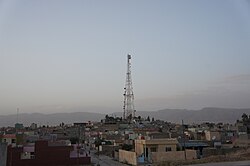Simele (original) (raw)
From Wikipedia, the free encyclopedia
Town in Iraq
Not to be confused with simile.
Town in Kurdistan Region, Iraq
| Simele سێمێل | |
|---|---|
| Town | |
 Semel in 2012 Semel in 2012 |
|
  Location in IraqShow map of Iraqi Kurdistan Location in IraqShow map of Iraqi Kurdistan  Simele (Iraq)Show map of Iraq Simele (Iraq)Show map of Iraq |
|
| Coordinates: 36°51′30″N 42°51′0.35″E / 36.85833°N 42.8500972°E / 36.85833; 42.8500972 | |
| Country |  Iraq Iraq |
| Autonomous region |  Kurdistan Region[1] Kurdistan Region[1] |
| Governorate | Dohuk Governorate |
| Population (2018) | 71,557 |
Simele or Semel (Kurdish: سێمێل, romanized: Sêmêl,[2][3] Arabic: سميل,[4] Syriac: ܣܡܠܐ[5]) is a town located in the Dohuk province of Kurdistan Region in Iraq. The town is on the main road that connects Kurdistan Region to its neighbor Turkey. It is 14 km (8.7 mi) west of Dohuk. The town had a population of 71,557 in July 2018.[6]
Simele was populated by Armenian and Assyrian refugees fleeing massacres during Sayfo and the Armenian genocide.[7] During the Simele massacre in 1933, around three thousand Assyrians were massacred prompting many to flee the country as a consequence.[8][9] The main Assyrian tribe in Simele at the time was Baz.[10]
In 2011, the population was mostly Kurdish with a small Assyrian minority of 635 people. Around half of the Assyrian minority adhere to the Assyrian Church of the East.[11] A small Armenian minority is still exists in the town.[11]
- ^ "Kurdistan Regional Government". KRG. Retrieved 2012-05-21.
- ^ KRSO (2009). "2009 - ناوی پاریزگا. يه که کارگيرييه كانی پاریزگاكانی هه ریمی کوردستان" (PDF) (in Kurdish). Kurdistan Region Statistics Office (KRSO). p. 139. Retrieved 6 February 2021.
- ^ "Daxûyanî ya serokatî ya Perlemana kurdistanê". Government of Kurdistan Region (in Kurdish). Retrieved 14 April 2020.
- ^ "قرأت لك.. "الآشوريون فى العراقى المعاصر" يبحث مشكلة الأقليات بالعراق". Youm7 (in Arabic). Retrieved 7 December 2020.
- ^ "Syriac Writers Union" (PDF). Sapra Suryaya. 2016.
- ^ "Iraq - Sumaīl (Sêmêl) [Simele]". Citypopulation.de. Retrieved 26 April 2022.
- ^ Safi, Marlo. "The Simele Massacre & the Unsung Hero of the Genocide Convention". National Review. Retrieved 27 June 2020.
- ^ "Iraq: continuous and silent ethnic cleansing Displaced persons in Iraqi Kurdistan and Iraqi refugees in Iran" (PDF). FIDH: 17. January 2003. Retrieved 14 April 2020.
- ^ Baarda, Tijmen C. (2020-02-26). "Arabic and the Syriac Christians in Iraq: Three Levels of Loyalty to the Arabist Project (1920–1950)". Arabic and Its Alternatives: 143–170. doi:10.1163/9789004423220_007. hdl:1887/86019. ISBN 9789004423220.
- ^ Donabed, Sargon George (2015). Reforging a Forgotten History: Iraq and the Assyrians in the Twentieth Century. Edinburgh University Press. pp. 108 & 114.
- ^ a b "Population Project". Shlama. 2011. Retrieved 26 April 2022.